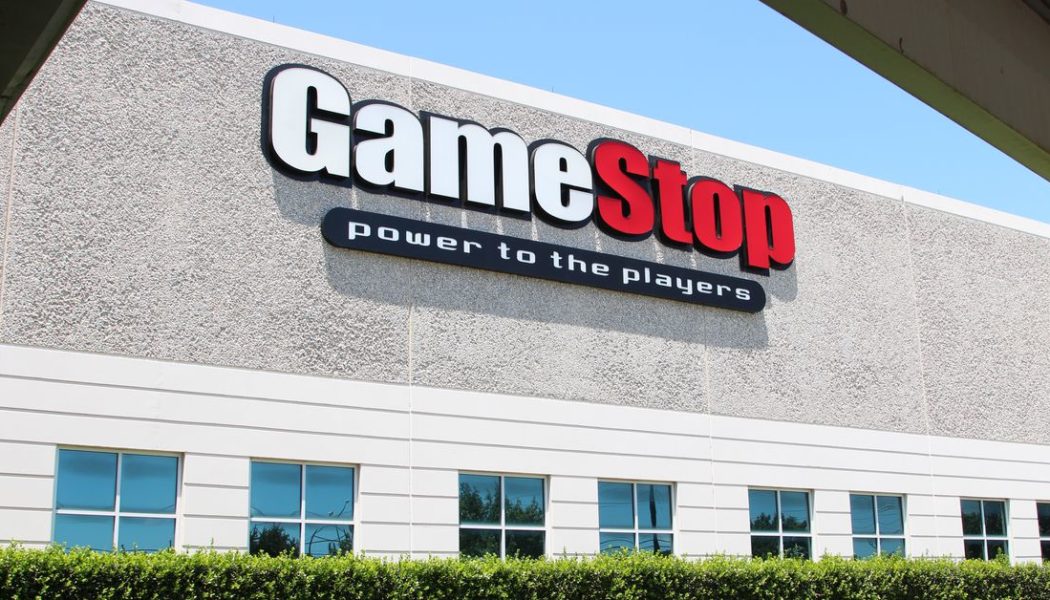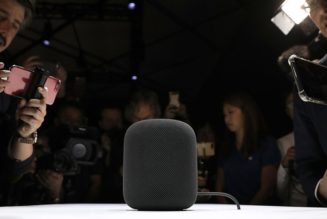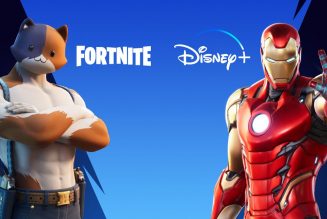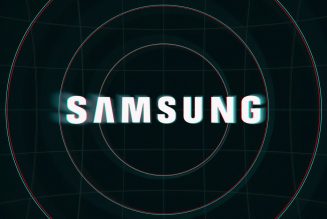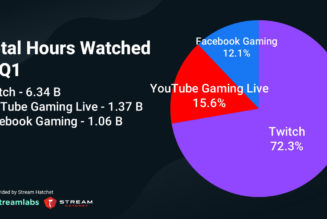/cdn.vox-cdn.com/uploads/chorus_asset/file/22263408/gamestop_stock_hero.jpg)
I was somewhat surprised that both Netflix and MSNBC chose to make documentaries about Wall Street Bets, GameStop, and retail traders. The majority of the action takes place online, after all. So what is the visual here? Watching someone type text into a box?
As a result, MSNBC’s feature, Diamond Hands: The Legend of WallStreetBets, and Netflix’s series, Eat the Rich: The GameStop Saga, rely heavily on stock footage. In the case of Diamond Hands, this has a ’90s MTV type of vibe; in the case of Eat the Rich, it seems like editors just slapped together whatever was handy and cheap.
These shows appear to be less art and more “content”
In both cases, these appear to be less art and more “content,” the kind of thing that’s cheap for streamers to commission. The story is gripping — certainly I found it gripping while it was happening — but the choice to make a documentary or a TV show about it is puzzling. At least Diamond Hands feinted at an aesthetic; Eat the Rich seems to be too openly contemptuous of its viewers to have considered more creative uses of stock. Both pieces of content felt rushed, trying to capitalize on attention while it was still there.
Diamond Hands uses several Reddit forum members as its narrators so that viewers get to know and care about them. That makes it more compelling when, for instance, former military diver Matt Kelly recounts his sleepless nights and inability to focus on work as the stock started to fly. Alisha B. Woods, who describes herself as having an “addictive personality,” moves from GameStop into crypto, another realm of gambling. Despite its goofy aesthetic — it features Redditors pounding their chests; one is interviewed in a helmet — it’s tightly edited, and a pretty good history of the immediate events.
Eat the Rich has larger ambitions, though it falls short of them. It opens by zooming back to the 2008 financial crisis — which is arguably the cause of this whole deal. A lot of the under-40 retail traders using Robinhood, which comprised 70 percent of the user base when the company dropped its filings to go public last year, had their lives upended by the financial crisis. The older ones lost their first jobs or couldn’t get their first jobs; the younger ones may have had to leave a foreclosed home. Meanwhile, Wall Street got bailed out.
As home prices and the stock market recovered after the financial crisis, millennials didn’t. They didn’t have enough money to participate in the recovery by buying those assets. They were instead often paying off debt. To make matters worse, when Silicon Valley boomed in the 2010s, that happened mostly in the private markets that most ordinary investors can’t access. Mark Zuckerberg got rich, but the rest of his age cohort? Not so much.
The resulting cynicism and resentment from 2008 are necessary for understanding how retail trading works. If you believe Wall Street is a rigged game, that valuations are just jokes, and that you are desperately behind in accumulating enough wealth to live an ordinary life, then yes, you are going to behave differently from the retail investors who got clobbered during the dot-com boom and bust.
Internet communities, most significantly Wall Street Bets, are what constitute financial populism now
Throw into this mix the rise of Robinhood and other apps like it. In ye olden dot-com days, retail investors pooled their money so that they had enough that brokers would take them seriously. Sure, this meant less access for any individual investor, but it also meant that if you wanted to yolo into out-of-the-money options, there were several other people, including the broker, who would try to talk you out of it.
Eat the Rich’s first episode gets bogged down in this backstory and Wall Street vocabulary. The filmmakers spend an awful lot of time explaining what, for instance, hedge funds are. Most anyone who’s even passingly familiar with Wall Street, perhaps because they’ve read the business section of a newspaper one time, will be bored.
It also makes the curious choice of focusing on CNBC’s Jim Cramer and Citron Research’s Andrew Left. To a previous generation of investors, these two men were popularizers. Cramer made investing into entertainment programs for retail and founded TheStreet.com; Left was noted for publishing his research on his shorts so that anyone could use it. Both were bewildered to be lumped in with the system they’d spent their careers distinguishing themselves from.
The truth is that both men were the system to the people younger than them. Mad Money premiered in 2005; Left began his career with StockLemon.com in 2001. (Sure, he’s a hedge fund guy, but he’s also a blogger.) His idea was that publishing his research might make it easier for various entities — retail investors, the SEC, whoever — to make informed decisions.
“We about to go ape like [famed short seller Michael] Burry did in ’08.”
Internet communities, most significantly Wall Street Bets, are what constitute populism now. Plus, shorts are unpopular after 2008; I suppose because there was something unsavory about how they could make money off others’ pain. At one point that year, the SEC halted short selling entirely.
Shorts are also the keystone species in the financial ecosystem, like Yellowstone’s wolves; they help cull the fraudulent from the market. Hindenburg Research exposed fraud at Nikola. That’s the whole strategy at the firm. Jim Chanos famously bet Enron would collapse.
Some practices do raise eyebrows. It is still possible to short the same shares multiple times. In GameStop’s case, short interest was 140 percent of the float as of January 21st, according to data from S3 Partners cited by Bloomberg.
The second episode gets to the action, after a brief rap from Mikey Guggenheim, a wannabe from New Jersey, called “I Like the Stock.” (Sample lyric: “we about to go ape like [famed short seller Michael] Burry did in ’08.”)
Indeed, Eat the Rich is focused on the zany. In Diamond Hands, we met pretty normal people: a service worker out of a job because of COVID, for instance. A worried dad. Here, we have a van life couple, a man who says he wants to make a TikTok house because “I just want to do TikToks all day in a big mansion with pretty girls,” and Guggenheim’s cringe rap.
- On July 27th, 2020, Keith Gill uploaded his first “Roaring Kitty” video.
- On September 8th, 2020, Reddit user JeffAmazon posted his thesis on GameStop, “The REAL Greatest Short Burn of the Century.”
- On January 11th, 2021, Ryan Cohen, riding high on the success of Chewy — a successful Pets.com — joined the GameStop board.
- On January 13th, 2021, shares of GameStop surged 57 percent. They rose another 22 percent on January 22nd before starting to fly on January 25th, the same day that hedge fund Melvin Capital received a cash infusion.
- On January 26th, Elon Musk tweeted about it.
- On January 27th, GameStock’s stock price peaked: $347.51.
- On January 28th, Robinhood and other brokers restricted buying on GameStop and other meme stocks.
- On February 9th, GameStop was down to $40 a share.
Curiously, for a documentary that promises to explain the GameStop short squeeze, and which luxuriates in backstory, Eat the Rich omits the other significant retail investor development: Elon Musk.
Musk’s use of social media to motivate retail predates anything done by Keith “Roaring Kitty” Gill
Musk tapped into his Twitter fandom for Tesla (and SpaceX), which is often heavily shorted. Musk has been in a long-standing weird internet slapfight with David Einhorn, a famed short seller. In 2018, Einhorn’s Tesla short had been the second-biggest winner for his fund; in response, Musk promised the “short burn of the century.” By 2019, Einhorn had taken heavy losses on a short position in Tesla, and Musk chose to taunt him about it. Musk was, by that point, adept at using Twitter to rally the Tesla faithful, some of whom are retail investors that own stock; in 2018, those retail investors also had ways to ask Tesla questions during its earnings calls.
Musk’s use of social media to motivate retail predates anything done by Keith “Roaring Kitty” Gill, also known as u/DeepFuckingValue. Indeed, Musk is so influential that he can move the prices of Dogecoin and, to a lesser extent, Bitcoin. Setting up Musk’s history with retail investors would not only have helped contextualize a movement that began well before January 2021 — it also would have explained why so many retail investors jumped in after Musk’s “GameStonk” tweet. Eat the Rich instead has a montage of retail investors saying they love Musk but don’t know why. Without this context, it’s also hard to know why some savvy investors — including retail investors! — called the top when Musk started tweeting.
There are some feints around the importance of social media and influencers but very little discussion of platform dynamics. I get that TikTok is sexier for filmmakers than Reddit, but as Ranjan Roy wrote, a Reddit redesign may have drawn the curious into r/WallStreetBets. That probably mattered more than Twitter and TikTok for the initial GameStop liftoff, because it was part of what formed r/WallStreetBets in the first place — just as traditional media mattered more toward the end of the run.
Gill-as-YouTuber (not Redditor) is central to Eat the Rich largely because, I suspect, one can use his YouTube clips. He didn’t participate in the series. Alvan Chow, u/JeffAmazon, did participate, reading his Reddit post aloud. (In Diamond Hands, this is done by his aspiring-actor brother.) Chow made $8 million on his trades, but he’s not a main character in Eat the Rich. It’s a shame — I found him insightful in Diamond Hands and liked him again here. Chow knows he was a pilot fish moving among sharks. He does not strike me as someone who harbors many illusions.
The GameStop saga wasn’t really David v. Goliath; it was Goliath v. Goliath with a David puppet out front
Eat the Rich could have used more of that. It entertains some odd speculation instead. Was Gill a mastermind who was engaging in market manipulation? Did Citadel force Robinhood’s hand? In both cases, the answer appears to be no, which makes it odd that the series spends so much time on both possibilities. It feints at the faux populism of Musk and Chamath Palihapitiya but doesn’t spend really explain them. Nor does it discuss the Silicon Valley investors who got rich on Robinhood; it wasn’t just Vlad Tenev, Robinhood’s founder and CEO. (Though all those shares are worth less now.)
Eat the Rich points out, belatedly, that hedge funds’ clients include things like, you know, pension funds, people’s 401(k)s, and so on. Rooting against the hedge funds, fun as it is, is effectively rooting against the little guys, too. That’s fine, as far as it goes. But it’s also true that this wasn’t a retail revolution. Sure, some hedge funds lost money — but some hedge funds made out, too. The GameStop saga wasn’t really David v. Goliath; it was Goliath v. Goliath with a David puppet out front. The narrative of the retail traders taking their revenge on hedge funders was catchy, but it was never really true.
The truth is, I’m still writing about GameStop a year and a half later because it’s a hell of a story. But it’s abstract, complex, and not especially fun to look at. If you do want to watch a documentary about the phenomenon, Diamond Hands is a tightly paced view of the experience of some average investors. Eat the Rich has bigger ambitions, but falls short of them. It feels sloppy.
I can’t help but think that both Diamond Hands and Eat the Rich would have been better as podcasts
Having seen both, I wonder why they exist at all. Things that happen online aren’t inherently visual. Both Diamond Hands and Eat the Rich would have been better as podcasts. Think of the money that could have been saved on stock footage!
For what it’s worth, GameStop wasn’t the only meme stock. There’s a Bloomberg list of 37 meme stocks now. Bed Bath & Beyond is in talks for more credit thanks to retail investors. AMC Theaters began catering to the retail crowd after they allowed it to zero out $600 million in debt, first offering free popcorn to its retail investors and then creating the “APE” dividend.
Retail investors appear to be draining out of the stock market this year. There was a lot of money sloshing around during the pandemic because of zero percent interest rates. In that world, it didn’t make sense to save money; instead, you put your cash in an SPAC (because if you don’t like the acquisition target, you get your $10 back) or took more risks in your stock portfolio because keeping money in your savings account meant losing spending power to inflation. Maybe you took out a loan to buy a house because hey, the loan was cheap!
When the Fed raised rates, a lot of froth receded. Robinhood’s transaction-based revenue dropped by half in the second quarter. There’s been an exodus of active users — a third fewer of them in the second quarter of 2022 than the year before. Assets under custody declined by a third. It’s possible that a motivated community of retail investors could roil the stock market again, but I wonder how frequently those conditions might come up now that money is getting tighter.
I don’t know if it’s possible to make better documentaries about Redditors. Maybe
